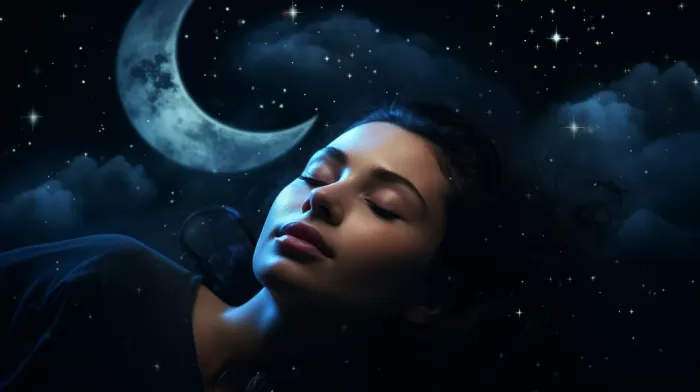Have you ever wondered why some nights you seem to drift off to sleep effortlessly, while on others you toss and turn for hours on end? Well, it might surprise you to know that events taking place high up in the night sky can have a significant impact on your quality of sleep. Researchers in Switzerland have discovered a potential link between the phases of the moon and the depth of our slumber.
A study of 33 participants, ranging in age from 20 to 74 years old, indicated that their sleep quality as well as their levels of the sleep-related hormone melatonin are connected to the lunar cycle. Participants experienced a drop in melatonin during a full moon, which can lead to restless, compromised sleep. Conversely, as the moon waxes and wanes, melatonin levels rise and it becomes easier to doze off and experience REM sleep – the crucial stage during which dreaming occurs.
Lead researcher Christian Cajochen states, “The only explanation we could come up with is that maybe there is a lunar clock in the brain, as found in other species like fish and other marine animals. But we don’t have direct evidence for that.”
Let’s Break It Down: Sleep Cycles and Lunar Cycles
There is growing evidence to suggest that our bodies may be impacted by the same gravitational forces exerted by the moon which are responsible for shaping tides. Some people claim that they feel more energetic during a full moon, while others seem to find it more difficult to relax and unwind, struggling to achieve a deep and restful night’s sleep.
The human body naturally operates on a 24-hour clock, known as our circadian rhythm, which controls our sleep patterns as well as various other aspects of our daily lives such as body temperature and hormone release. As the day progresses, melatonin levels begin to rise steadily – peaking during the evening hours and gradually decreasing as the night goes on. Melatonin is an essential hormone for regulating our sleep-wake cycle, with higher levels typically resulting in better, deeper sleep.
The lunar cycle, on the other hand, is approximately 29.5 days long and is divided into four phases: new moon, first quarter, full moon, and last quarter. Interestingly, researchers have found that sleep difficulties and disruptions to melatonin production tend to be more common during the full moon phase.
So, could it be that even our sleep is governed by the movements of the moon?
Delving Deeper: The Influence of the Moon Beyond Sleep
It might be easy to dismiss the idea of the moon having an impact on our sleep as pure superstition, but evidence of its influence reaches far beyond our bedtime habits.
The word “lunacy,” derived from the Latin word “luna” for moon, was coined based on the belief that mental health was influenced by the phases of the moon. Some ancient cultures even advocated for certain activities to take place during specific moon phases to maximize success. The idea that the gravitational pull of the moon can alter our biological processes is not quite as farfetched as it may initially seem.
Finding Balance: Techniques for a Better Night’s Sleep
Regardless of the cause, disrupted sleep can have detrimental effects on our daily lives, with consequences ranging from irritability and fatigue to impaired decision-making abilities. To help regulate your body’s internal clock and improve your sleep quality, consider implementing the following techniques:
- Create a sleep ritual: Establishing a consistent routine can help signal to your body that it’s time to wind down and prepare for sleep. This might include activities such as a warm bath, some gentle stretching, or reading a book.
-
Limit exposure to screens before bedtime: The blue light emitted by smartphones, tablets, and computers has been found to interfere with melatonin production. Aim to turn off all screens at least one hour before bed.
-
Create a comfortable sleep environment: Ensure your bedroom is a space conducive to restful sleep by keeping the temperature cool, maintaining a quiet atmosphere, and investing in a high-quality mattress and pillow that provide adequate support.
-
Exercise regularly: Physical activity can help to stabilize your body’s sleep-wake cycle, but try to finish exercising at least a few hours before bedtime so your body has time to cool down and unwind.
-
Monitor your sleep: Using a sleep tracker can give you further insights into the quality of your sleep and help you identify patterns or issues that may be affecting your slumber.
In conclusion, the cosmic influence of the moon on our sleep patterns may seem like a thing of legend, but the scientific evidence suggests that there could indeed be a connection between the lunar cycle and our slumber. By understanding this connection and implementing strategies for better sleep, you can ensure that you are well-rested and ready to face the day ahead, no matter what phase the moon is in.



